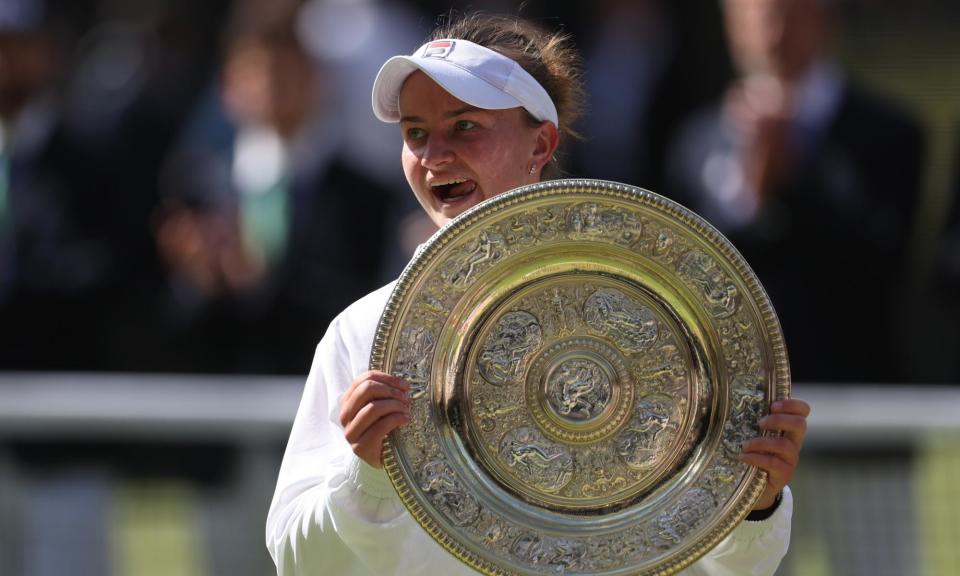Krejčiková continues Czechs’ Wimbledon success – and pays tribute to her mentor

What is it about Czech women and Wimbledon? Barbora Krejčiková became the third player in the last decade from that nation of 10.6 million people to win the women’s singles title, following Petra Kvitová in 2014 and Markéta Vondroušová last year. And – of more personal resonance to Krejčiková – she also joins Jana Novotná, the 1998 Wimbledon champion, who came from the same city, Brno, and became Krejčiková’s mentor and coach before dying of cancer in 2017 aged 49.
Krejčiková, the world No 32, beat Jasmine Paolini, the seventh seed from Italy, in just over two hours: 6-2, 2-6, 6-4. Afterwards, on court, she was asked what people in her homeland would make of her victory. “Well, I think nobody really believes it,” she replied, prompting a big laugh from the Centre Court stands. “Nobody believed I got to the final. And nobody will believe I won Wimbledon. I still cannot believe it – it’s unbelievable!”
On Novotná, the 28-year-old Krejčiková reflected movingly on going to her house when she was 18 with a letter asking for help. “Everything that happened during that moment, it just changed my life,” she said. “Jana was the one who told me that I had the potential. And before she passed away, she told me to win a slam … I never dreamed I would win the same trophy as Jana did in 1998.”
Krejčiková was presented with the Venus Rosewater dish by Debbie Jevans, the chair of the All England Club. On a warm-ish, fluffy-cloud afternoon, there was plenty of tennis royalty in attendance (Billie Jean King, Martina Navratilova, Sue Barker among them), but the Princess of Wales, so often a regular at Wimbledon in recent years, was absent and Jevans stepped in “at her request”.
It was a bizarre, sometimes brilliant, always tense, topsy-turvy tennis match. Krejčiková, the slight favourite coming in, played a flawless first set: John McEnroe on the BBC called hers “the perfect grass-court game”, with her mix of pinpoint serves, thumping forehands and crafty slices. Paolini, who usually has an unfailingly sunny disposition and was a clear crowd favourite, didn’t crack a smile. Screams of “Pojď!” – Czech for “Come on!” – reverberated round a shocked Centre Court.
But Paolini, a power-packed 5ft 4in, is tenacious and, after a restorative bathroom break, she roared back. She started dictating points, smiting her forehand with menace. The noise in the stadium grew, and even her walk changed: she started strutting, bouncing and jigging round the court. Now the cries were of “Forza!.”
Krejčiková disappeared for her own freshen-up after the second set – hoping, no doubt, that Paolini would tighten up. The third set was the first time both players played well at the same time, but a double fault from Paolini at 3-3 handed Krejčiková the advantage, and the Czech just about held her nerve to squeak through on her third match point.
Krejčiková– a fan of embroidery and Lego off-court – has a reputation as a low-key personality, but she celebrated by clambering into the stands and having a group bearhug with her team.
The men’s final on Sunday afternoon, meanwhile, will be contested by two more familiar faces: Novak Djokovic and Carlos Alcaraz. The match is a replay of last year’s climax, which Alcaraz, the then 20-year-old Spaniard, won in five extraordinary sets.
This time, the age-defying and seemingly unbreakable Djokovic, now 37, will be shooting for his 25th grand slam success and his eighth Wimbledon title – equalling Roger Federer’s record. There will be a strong – previously heretical – case to argue that Djokovic could be seen as the greatest grass-court player of all time.
Even with all the excitement about the rematch, it has been impossible to escape the fact that this will not be the only game in town on Sunday. Alcaraz received good-natured boos on Centre Court on Friday when he made a tongue-in-cheek joke about Spain beating England in the Euro 2024 final. Later, he said that if he and his nation’s football team could do the double, it would be the “perfect Sunday”.
Djokovic, who has been in combative mood with the fans at this year’s Wimbledon, might find himself with unexpected support against Alcaraz. “I’m not sure if I’m going to break his heart,” Djokovic said. “I’m not intending to do that.”

